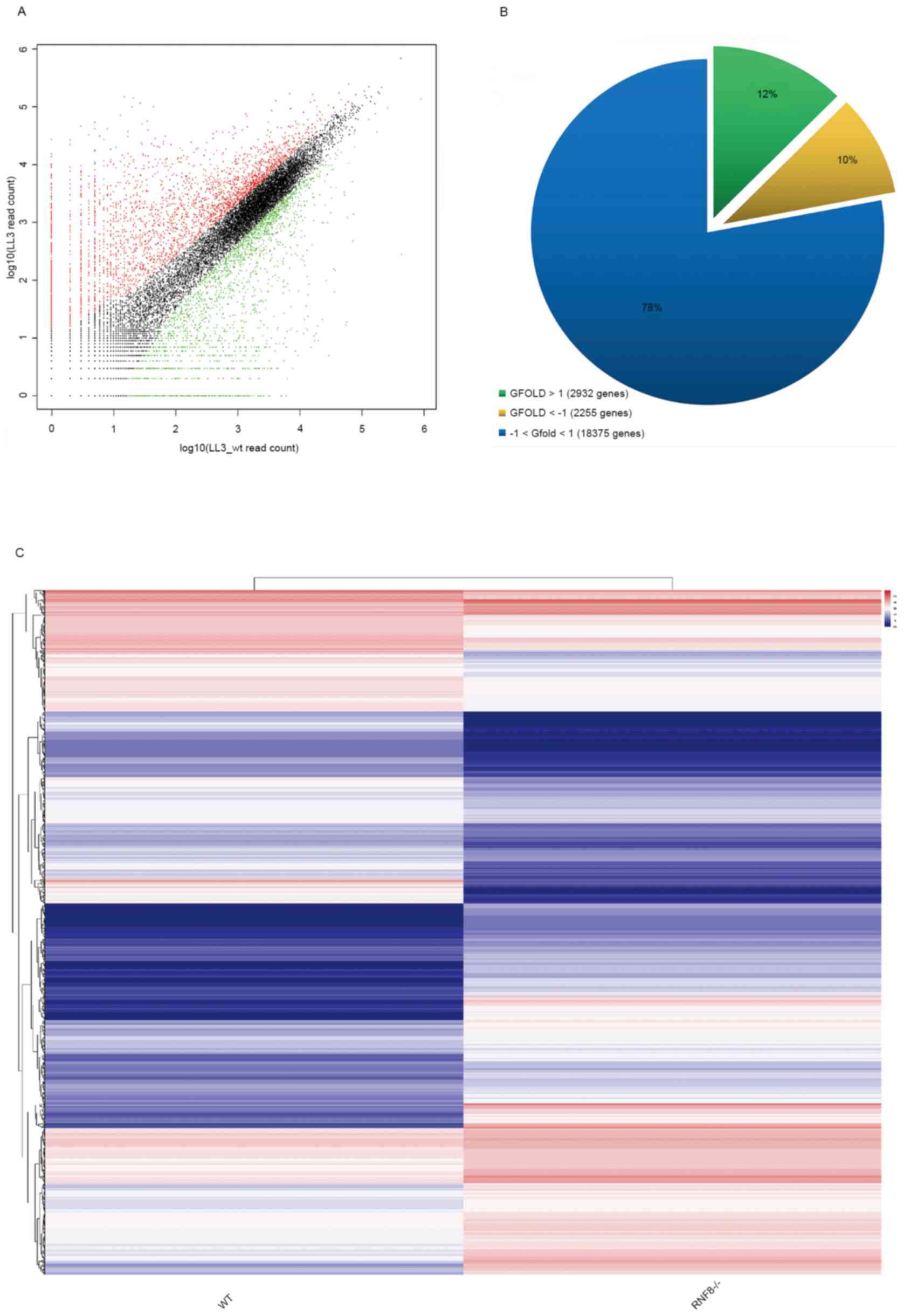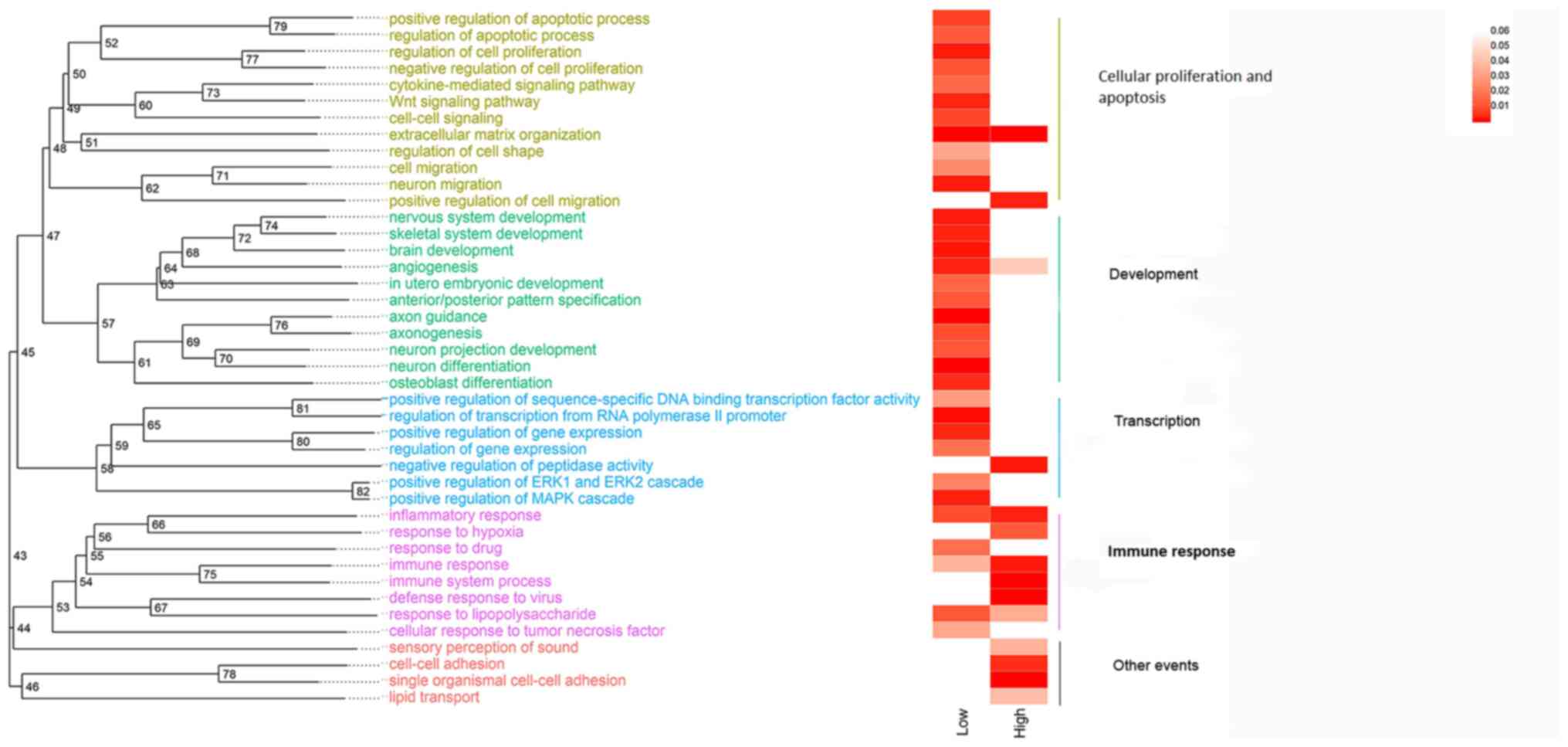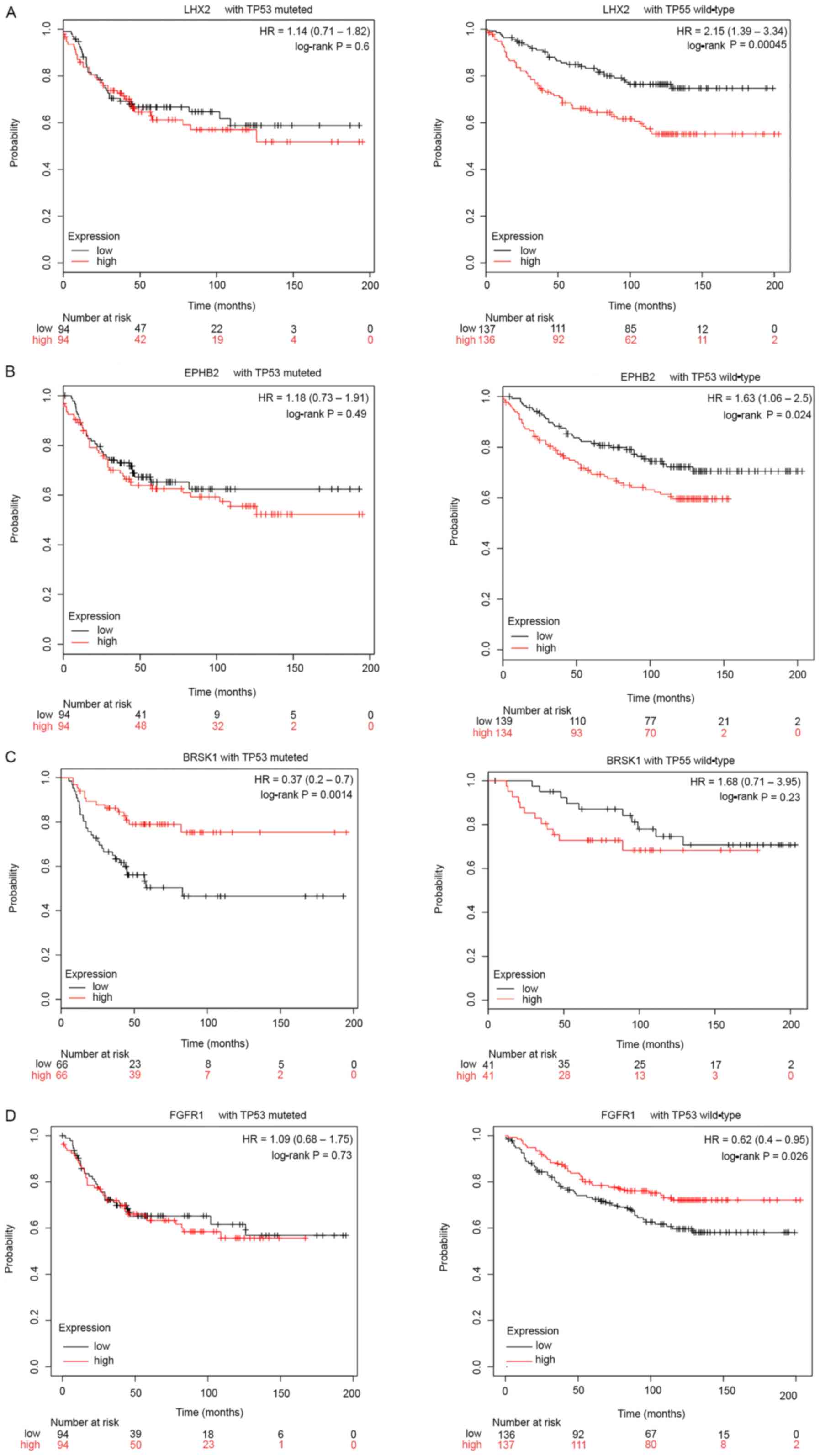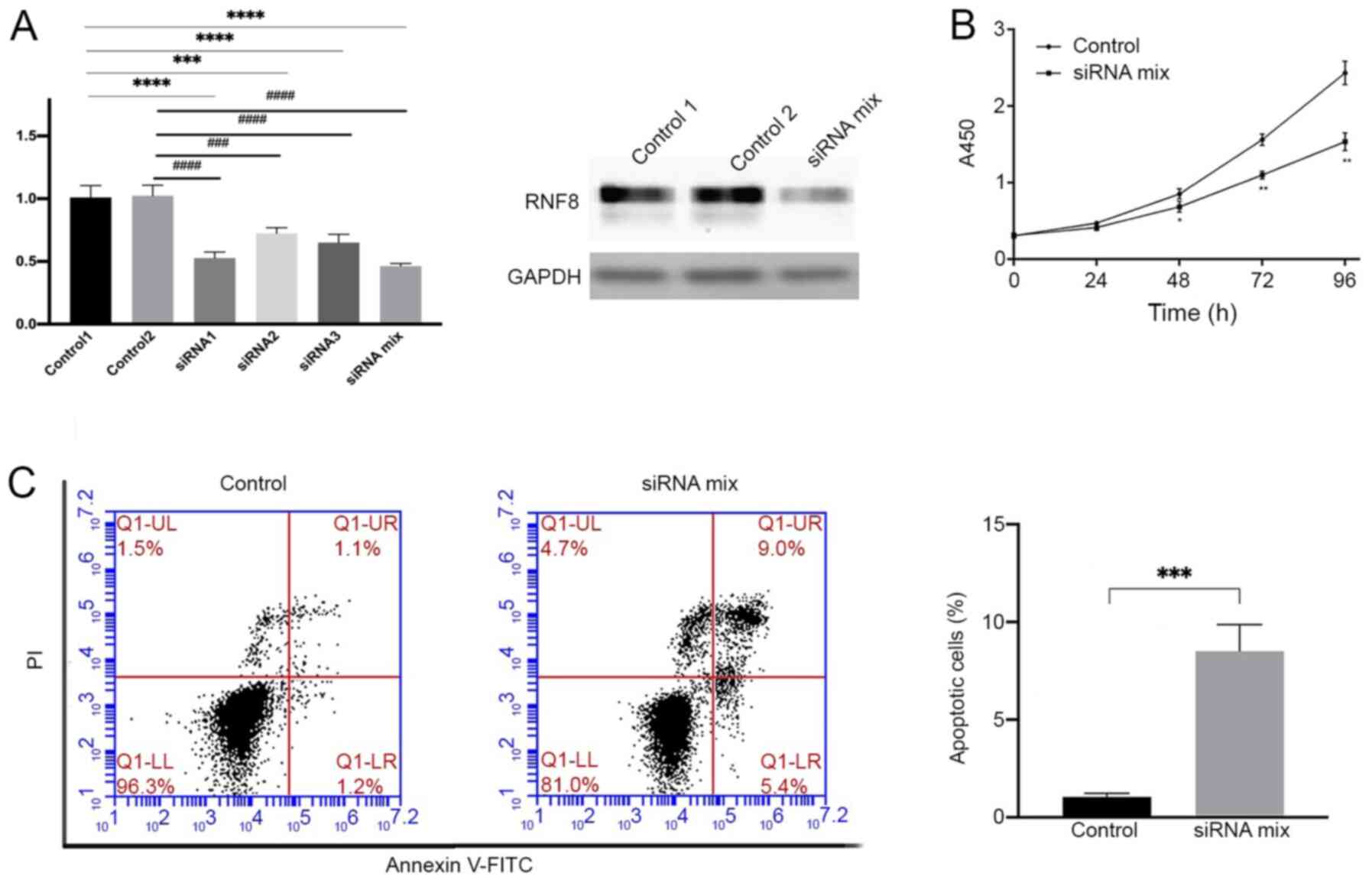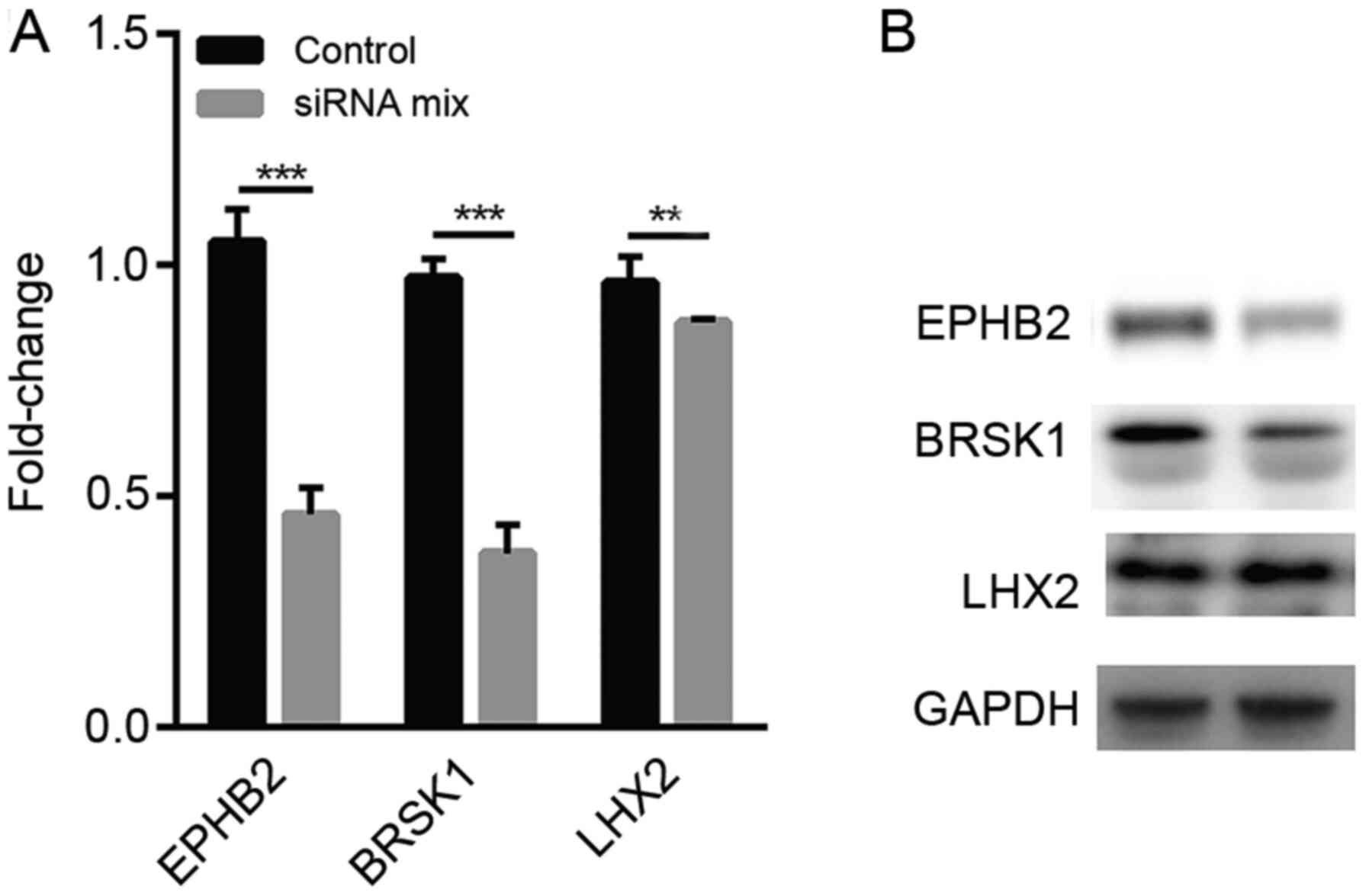|
1
|
Pilevarzadeh M, Amirshahi M,
Afsargharehbagh R, Rafiemanesh H, Hashemi SM and Balouchi A: Global
prevalence of depression among breast cancer patients: A systematic
review and meta-analysis. Breast Cancer Res Treat. 176:519–533.
2019. View Article : Google Scholar : PubMed/NCBI
|
|
2
|
Greten FR and Grivennikov SI: Inflammation
and cancer: Triggers, mechanisms, and consequences. Immunity.
51:27–41. 2019. View Article : Google Scholar : PubMed/NCBI
|
|
3
|
Pederiva C and Farnebo M: RNF8-The
Achilles heel of DNA repair when splicing rules. Cell Cycle.
17:137–145. 2018. View Article : Google Scholar : PubMed/NCBI
|
|
4
|
Jacobs JJ: Fusing telomeres with RNF8.
Nucleus. 3:143–149. 2012. View Article : Google Scholar : PubMed/NCBI
|
|
5
|
Stewart GS: Solving the RIDDLE of 53BP1
recruitment to sites of damage. Cell Cycle. 8:1532–1538. 2009.
View Article : Google Scholar : PubMed/NCBI
|
|
6
|
Li F, Liu B, Zhou X and Xu Q: Silencing of
E3 ubiquitin ligase RNF8 enhances ionizing radiation sensitivity of
medulloblastoma cells by promoting the deubiquitination of PCNA.
Oncol Res. 26:1365–1373. 2018. View Article : Google Scholar : PubMed/NCBI
|
|
7
|
Li L, Guturi KKN, Gautreau B, Patel PS,
Saad A, Morii M, Mateo F, Palomero L, Barbour H, Gomez A, et al:
Ubiquitin ligase RNF8 suppresses Notch signaling to regulate
mammary development and tumorigenesis. J Clin Invest.
128:4525–4542. 2018. View Article : Google Scholar : PubMed/NCBI
|
|
8
|
Wang S, Luo H, Wang C, Sun H, Sun G, Sun
N, Zeng K, Song H, Zou R, Zhou T, et al: RNF8 identified as a
Co-activator of estrogen receptor α promotes cell growth in breast
cancer. Biochim Biophys Acta Mol Basis Dis. 1863:1615–1628. 2017.
View Article : Google Scholar : PubMed/NCBI
|
|
9
|
Yamamoto T, Taira Nihira N, Yogosawa S,
Aoki K, Takeda H, Sawasaki T and Yoshida K: Interaction between
RNF8 and DYRK2 is required for the recruitment of DNA repair
molecules to DNA double-strand breaks. FEBS Lett. 591:842–853.
2017. View Article : Google Scholar : PubMed/NCBI
|
|
10
|
Kuang J, Li L, Guo L, Su Y, Wang Y, Xu Y,
Wang X, Meng S, Lei L, Xu L and Shao G: RNF8 promotes
epithelial-mesenchymal transition of breast cancer cells. J Exp
Clin Cancer Res. 35:882016. View Article : Google Scholar : PubMed/NCBI
|
|
11
|
Gao S, Wu J, Liang L and Xu R: RNF8
negatively regulates NF-kappaB signaling by targeting IkappaB
kinase: Implications for the regulation of inflammation signaling.
Biochem Biophys Res Commun. 488:189–195. 2017. View Article : Google Scholar : PubMed/NCBI
|
|
12
|
Xu G, Chapman JR, Brandsma I, Yuan J,
Mistrik M, Bouwman P, Bartkova J, Gogola E, Warmerdam D, Barazas M,
et al: REV7 counteracts DNA double-strand break resection and
affects PARP inhibition. Nature. 521:541–544. 2015. View Article : Google Scholar : PubMed/NCBI
|
|
13
|
Feng J, Meyer CA, Wang Q, Liu JS, Shirley
Liu X and Zhang Y: GFOLD: A generalized fold change for ranking
differentially expressed genes from RNA-seq data. Bioinformatics.
28:2782–2788. 2012. View Article : Google Scholar : PubMed/NCBI
|
|
14
|
Yu G: Gene Ontology Semantic Similarity
Analysis Using GOSemSim. Kidder B: Stem Cell Transcriptional
Networks. Methods Mol Biol. 2117:207–215. 2020. View Article : Google Scholar : PubMed/NCBI
|
|
15
|
Yu G, Lam TT, Zhu H and Guan Y: Two
methods for mapping and visualizing associated data on phylogeny
using ggtree. Mol Biol Evol. 35:3041–3043. 2018. View Article : Google Scholar : PubMed/NCBI
|
|
16
|
Livak KJ and Schmittgen TD: Analysis of
relative gene expression data using real-time quantitative PCR and
the 2(-Delta Delta C(T)) method. Methods. 25:402–408. 2001.
View Article : Google Scholar : PubMed/NCBI
|
|
17
|
Li L, Halaby MJ, Hakem A, Cardoso R, El
Ghamrasni S, Harding S, Chan N, Bristow R, Sanchez O, Durocher D
and Hakem R: Rnf8 deficiency impairs class switch recombination,
spermatogenesis, and genomic integrity and predisposes for cancer.
J Exp Med. 207:983–997. 2010. View Article : Google Scholar : PubMed/NCBI
|
|
18
|
Giordano A, Liu Y, Armeson K, Park Y,
Ridinger M, Erlander M, Reuben J, Britten C, Kappler C, Yeh E and
Ethier S: Polo-like kinase 1 (Plk1) inhibition synergizes with
taxanes in triple negative breast cancer. PLoS One.
14:e02244202019. View Article : Google Scholar : PubMed/NCBI
|
|
19
|
Petry V, Bonadio RC, Cagnacci AQC, Senna
LAL, Campos RDNG, Cotti GC, Hoff PM, Fragoso MCBV and Estevez-Diz
MDP: Radiotherapy-induced malignancies in breast cancer patients
with TP53 pathogenic germline variants (Li-Fraumeni syndrome). Fam
Cancer. 19:47–53. 2020. View Article : Google Scholar : PubMed/NCBI
|
|
20
|
Arturo JF, Chobrutskiy BI, Yeagley M,
Patel DN, Falasiri S, Patel JS and Blanck G: Electrostatic
complementarity of B-cell receptor CDR3s and TP53-mutant amino
acids in breast cancer is associated with increased disease-free
survival rates. Cell Mol Immunol. 17:776–778. 2020. View Article : Google Scholar : PubMed/NCBI
|
|
21
|
Kongsema M, Zona S, Karunarathna U,
Cabrera E, Man EP, Yao S, Shibakawa A, Khoo US, Medema RH, Freire R
and Lam EW: RNF168 cooperates with RNF8 to mediate FOXM1
ubiquitination and degradation in breast cancer epirubicin
treatment. Oncogenesis. 5:e2522016. View Article : Google Scholar : PubMed/NCBI
|
|
22
|
Lee HJ, Li CF, Ruan D, Powers S, Thompson
PA, Frohman MA and Chan CH: The DNA damage transducer RNF8
facilitates cancer chemoresistance and progression through twist
activation. Mol Cell. 63:1021–1033. 2016. View Article : Google Scholar : PubMed/NCBI
|
|
23
|
Mandemaker IK, van Cuijk L, Janssens RC,
Lans H, Bezstarosti K, Hoeijmakers JH, Demmers JA, Vermeulen W and
Marteijn JA: DNA damage-induced histone H1 ubiquitylation is
mediated by HUWE1 and stimulates the RNF8-RNF168 pathway. Sci Rep.
7:153532017. View Article : Google Scholar : PubMed/NCBI
|
|
24
|
Paul A and Wang B: RNF8-and
Ube2S-dependent ubiquitin lysine 11-linkage modification in
response to DNA damage. Mol Cell. 66:458–472.e5. 2017. View Article : Google Scholar : PubMed/NCBI
|
|
25
|
Yoshida K and Miki Y: Role of BRCA1 and
BRCA2 as regulators of DNA repair, transcription, and cell cycle in
response to DNA damage. Cancer Sci. 95:866–871. 2004. View Article : Google Scholar : PubMed/NCBI
|
|
26
|
Rai R, Li JM, Zheng H, Lok GT, Deng Y,
Huen MS, Chen J, Jin J and Chang S: The E3 ubiquitin ligase Rnf8
stabilizes Tpp1 to promote telomere end protection. Nat Struct Mol
Biol. 18:1400–1407. 2011. View Article : Google Scholar : PubMed/NCBI
|
|
27
|
Halaby MJ, Hakem A, Li L, El Ghamrasni S,
Venkatesan S, Hande PM, Sanchez O and Hakem R: Synergistic
interaction of Rnf8 and p53 in the protection against genomic
instability and tumorigenesis. PLoS Genet. 9:e10032592013.
View Article : Google Scholar : PubMed/NCBI
|
|
28
|
Kaur RP, Vasudeva K, Kumar R and Munshi A:
Role of p53 Gene in breast cancer: Focus on mutation spectrum and
therapeutic strategies. Curr Pharm Des. 24:3566–3575. 2018.
View Article : Google Scholar : PubMed/NCBI
|
|
29
|
Duffy MJ, Synnott NC and Crown J: Mutant
p53 in breast cancer: Potential as a therapeutic target and
biomarker. Breast Cancer Res Treat. 170:213–219. 2018. View Article : Google Scholar : PubMed/NCBI
|
|
30
|
Zhou T, Yi F, Wang Z, Guo Q, Liu J, Bai N,
Li X, Dong X, Ren L, Cao L and Song X: The functions of DNA damage
factor RNF8 in the pathogenesis and progression of cancer. Int J
Biol Sci. 15:909–918. 2019. View Article : Google Scholar : PubMed/NCBI
|
|
31
|
Wang M, Chen X, Chen H, Zhang X, Li J,
Gong H, Shiyan C and Yang F: RNF8 plays an important role in the
radioresistance of human nasopharyngeal cancer cells in
vitro. Oncol Rep. 34:341–349. 2015. View Article : Google Scholar : PubMed/NCBI
|
|
32
|
Fu R, Han CF, Ni T, Di L, Liu LJ, Lv WC,
Bi YR, Jiang N, He Y, Li HM, et al: A ZEB1/p53 signaling axis in
stromal fibroblasts promotes mammary epithelial tumors. Nat Commun.
10:32102019. View Article : Google Scholar : PubMed/NCBI
|















